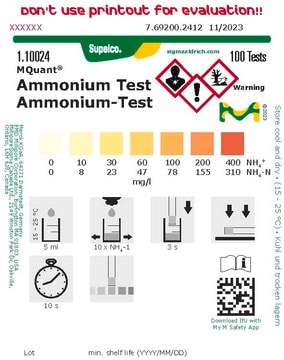GS73
GST M3-3, Recombinant Human
Synonym(s):
GST5, GSTB, GTM3, glutathione S-transferase mu 3
Sign Into View Organizational & Contract Pricing
All Photos(1)
About This Item
UNSPSC Code:
12352200
NACRES:
NA.26
Recommended Products
biological source
human
Quality Level
recombinant
expressed in E. coli
Assay
>95% (SDS-PAGE)
form
frozen liquid
specific activity
5.72 units/mg protein
concentration
2.95 mg/mL
storage temp.
−70°C
Gene Information
human ... GSTM3(2947)
General description
using spectrophotometric determination of 1-chloro-2,4-dinitrobenzene (CDNB) conjugation with reduced glutathione (1 mM) in 100 mM NaPO4 (pH 6.5) at room temperature.
Biochem/physiol Actions
Glutathione S-transferase mu 3 (GSTM3) is an enzyme that in humans is encoded by the GSTM3 gene. Glutathione S-transferases (GSTs) are a family of enzymes that play an important role in detoxification by catalyzing the conjugation of many hydrophobic and electrophilic compounds with reduced glutathione. Based on their biochemical, immunologic, and structural properties, cytosolic and membrane-bound forms of glutathione S-transferase are encoded by two distinct supergene families. At present, eight distinct classes of the soluble cytoplasmic mammalian glutathione S-transferases have been identified: alpha, kappa, mu, omega, pi, sigma, theta and zeta. The GSTs are thought to function in xenobiotic metabolism and play a role in susceptibility to cancer, and other diseases.
This gene encodes a glutathione S-transferase that belongs to the mu class. The mu class of enzymes functions in the detoxification of electrophilic compounds, including carcinogens, therapeutic drugs, environmental toxins and products of oxidative stress, by conjugation with glutathione. The genes encoding the mu class of enzymes are organized in a gene cluster on chromosome 1p13.3 and are known to be highly polymorphic. These genetic variations can change an individual′s susceptibility to carcinogens and toxins as well as affect the toxicity and efficacy of certain drugs. Mutations of this class mu gene have been linked with a slight increase in a number of cancers, likely due to exposure with environmental toxins. Alternative splicing results in multiple transcript variants.
Storage and Stability
The enzyme should be used by the end-user customer within 1 year of receipt.
Storage Class Code
10 - Combustible liquids
WGK
WGK 1
Flash Point(F)
Not applicable
Flash Point(C)
Not applicable
Certificates of Analysis (COA)
Search for Certificates of Analysis (COA) by entering the products Lot/Batch Number. Lot and Batch Numbers can be found on a product’s label following the words ‘Lot’ or ‘Batch’.
Already Own This Product?
Find documentation for the products that you have recently purchased in the Document Library.
Yu Xu et al.
PloS one, 9(1), e83851-e83851 (2014-01-15)
Glutathione S-transferase M3 (GSTM3) is an important member of the GSTs that plays a critical role in the development of head and neck cancer (HNC). Several studies have investigated between the GSTM3 A/B polymorphism and risk of HNC, however, the
X Tan et al.
British journal of cancer, 109(12), 3105-3115 (2013-10-26)
Glutathione S-transferase mu 3 (GSTM3) has been proven to be downregulated in renal cell carcinoma (RCC). We aimed to characterise the role of GSTM3 and its genetic predisposition on the occurrence and postoperative prognosis of RCC. The effect of GSTM3
D Teixeira et al.
Brazilian journal of medical and biological research = Revista brasileira de pesquisas medicas e biologicas, 43(7), 677-680 (2010-06-16)
A 3-bp insertion/deletion polymorphism in intron 6 of GSTM3 (rs1799735, GSTM3*A/*B) affects the activity of the phase 2 xenobiotic metabolizing enzyme GSTM3 and has been associated with increased cancer risk. The GSTM3*B allele is rare or absent in Southeast Asians
Xu Feng et al.
Asian Pacific journal of cancer prevention : APJCP, 13(9), 4465-4468 (2012-11-22)
The conclusions of published reports on the relationship between the glutathione S-transferase M3 (GSTM3) A/B gene polymorphism and the risk of lung cancer are still debated. This meta-analysis was performed to evaluate the association between GSTM3 and the risk of
Jian Liu et al.
Zhonghua yi xue yi chuan xue za zhi = Zhonghua yixue yichuanxue zazhi = Chinese journal of medical genetics, 24(5), 582-585 (2007-10-09)
To investigate the distribution of -63A/C polymorphism of human glutathione S-transferase M3(GSTM3) gene in Chinese Han population and the association of -63A/C polymorphism with essential hypertension (EH). -63A/C polymorphism of GSTM3 gene was examined by polymerase chain reaction-restriction fragment length
Our team of scientists has experience in all areas of research including Life Science, Material Science, Chemical Synthesis, Chromatography, Analytical and many others.
Contact Technical Service





